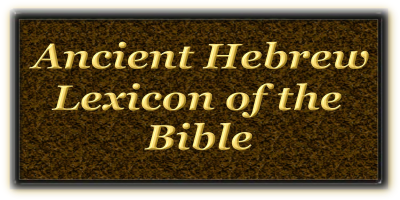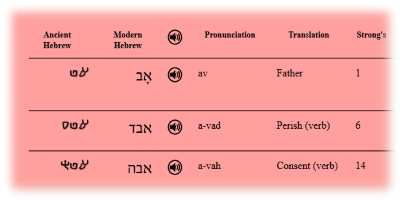Amen

אָמֵן
Strong’s #543
amen
And Benaiah the son of Jehoiada answered the king, and said, Amen: YHWH, the God of my lord the king, say so too. (1 Kings 1:36)
Worldwide this is the most famous of all Hebrew words. But, do we know what it means? This word comes from the root aman (Strong’s #539), pronounced ah-mahn, and means to be firmly planted in place as in Isaiah 22:23 which speaks of a “nail fastened to a secure place.” The noun form, amen, pronounced ah-mehn, is used in the Biblical text by persons who are affirming a statement. In other words, they are saying “I am firmly agreeing with what has been said.” The next time we say amen, let’s think about what we are agreeing to.
Beard

זָקָן
Strong’s #2206
zaqan
“that there came men from Shechem, from Shiloh, and from Samaria, even fourscore men, having their beards shaven and their clothes rent, and having cut themselves, with meal-offerings and frankincense in their hand, to bring them to the house of YHWH.” (Jeremiah 41:5)
In ancient Hebrew culture a long and white beard was a sign of age, maturity and wisdom. The verb form of this word, zaqeyn (Strong’s #2204), is the Hebrew meaning “to be old.”
Bread

לֶחֶם
Strong’s #3899
lechem
“in the sweat of thy face shalt thou eat bread, till thou return unto the ground; for out of it wast thou taken: for dust thou art, and unto dust shalt thou return.” (Genesis 3:19)
The dough is placed on the table and kneaded by hitting it with the fists, rolling it back and forth, picking it up and turning it over, and... Kind of sounds like a fight, doesn’t it? Actually, the Hebrew noun lechem means “bread” and comes from the verbal root lacham (Strong’s #3898), and means “to fight.” The place called Bethlehem is actually two Hebrew words: beyt (Strong’s #1004) meaning “house” and lechem meaning “bread.” Together they mean “house of bread.” In Genesis 3:19 we read, In the sweat of your face you shall eat bread. Could this be because we have to fight (till and weed) the ground to bring up the crop, fight (thresh and winnow) the grain to remove the husk from the seeds, fight (grind) the seeds to turn them into flour and fight (knead) the dough to make the bread?
Camel

גָּמָל
Strong’s #1581
gamal
“behold, the hand of YHWH is upon thy cattle which are in the field, upon the horses, upon the asses, upon the camels, upon the herds, and upon the flocks: there shall be a very grievous murrain.” (Exodus 9:3)
The English word camel is from the Greek word kamelos which in turn is from the Hebrew word gamal. The camel was a common animal in the herds of the nomads of both the ancient and modern times. A nomad’s wealth was measured by the size of his herds of livestock including camels (see Genesis 30:43). Camels were a choice beast of burden because of their ability to carry large loads and being able to travel long distances without water.
City

עִיר
Strong’s #5892
iyr
And YHWH came down to see the city and the tower, which the children of men builded. (Genesis 11:5)
Do cities sometime appear as “dark” places? The Ancient Hebrews seemed to think so. The Hebrew parent root ar can mean a “city” or an “enemy.” Take a look at these other Hebrew words, all with the ar root within them. Ariyph is a cloud; sa’ar is a storm; arav is to grow dark; ur is blind; ya’ar is a forest; iyr is a city; sho’ar is offensive or vile and arphel (origins of awful?) is a thick darkness.
Dog

כֶּלֶב
Strong’s #3611
kelev
And the Philistine said unto David, Am I a dog, that thou comest to me with staves? And the Philistine cursed David by his gods. (1 Samuel 17:43)
The Hebrew word kelev meaning “dog” is only mentioned 31 times in the Hebrew Bible, but never refers to an actual dog. Some references to dogs are as analogies such as in Psalm 59:6: They return at evening, they howl like a dog, And go round about the city. Many references to dogs portray them in a negative light: His watchmen are blind, they are all without knowledge; they are all dumb dogs, they cannot bark; dreaming, lying down, loving to slumber. Yea, they are greedy dogs which can never have enough (Isaiah 56:10,11). However, there is another interpretation of this word, which could mean “like a heart,” by interpreting the letter kaph as the prefix meaning “like,” and the noun lev, meaning “heart.”
Dry ground

יַבָּשָׂה
Strong’s #3004
yabashah
And God said, Let the waters under the heavens be gathered together unto one place, and let the dry land appear: and it was so. (Genesis 1:9)
To understand the original Hebraic concrete meaning of English abstract words used in translations of the Bible, it helps to look at the roots of the Hebrew word and other words derived from the same root. For instance, the word “shame” is an abstract word but is related to a “dried up ground.” When a lake or pond dries up, all of the organic matter begins to decay and stink, which is the Hebrew word ba’ash (Strong’s #887), derived from the same root as yabashah. The word bushah (Strong’s #955), also derived from the same root, is translated as “shame,” but is Hebraicly understood as something someone does that really “stinks.”
Dwelling

מוֹשָׁב
Strong’s #4186
moshav
they saw not one another, neither rose any one from his place for three days: but all the children of Israel had light in their dwellings. (Exodus 10:23)
The noun moshav comes from the root yashav (Strong’s #3427) meaning “to settle.” A common formation of a noun from a root is to add the letter “M” to the front of the root. This “M” usually adds the meaning “place” to the root, so moshav means “settling place” or “dwelling.”
Fish

דָּג
Strong’s #1709
dag
“And the fear of you and the dread of you shall be upon every beast of the earth, and upon every bird of the heavens; With all wherewith the ground teemeth, and all the fishes of the sea, into your hand are they delivered.” (Genesis 9:2)
In the original pictographic script used to write Hebrew, and other Semitic languages, this word was written with the picture of a door, the letter dalet, representing a “back and forth movement” and the picture of a “foot,” the letter gimel. When these two letters are combined we have “the back and forth movement of the foot/tail,” a perfect image for a “fish.” Interestingly, the “a” in the Hebrew word dag is pronounced with a short “a” and would therefore be pronounced like our word “dog,” another animal with a “tail that moves back and forth.” Because of the abundance of fish caught in nets, this word is the origin of another Hebrew word: dagah (Strong’s #1711) meaning “abundance.”
Flute

חָלִיל
Strong’s #2485
hhaliyl
And all the people came up after him, and the people piped with pipes, and rejoiced with great joy, so that the earth rent with the sound of them. (1 Kings 1:40)
The Hebrew word hhaliyl is an ancient type of flute and comes from the root hhalal (Strong’s #2490) meaning “to pierce” through, the idea of a “pipe” with holes pierced through it.
Fly

עוּף
Strong’s #5774
ooph
And God said, Let the waters swarm with swarms of living creatures, and let birds fly above the earth in the open firmament of heaven. (Genesis 1:20)
This verb means “to fly,” while the noun form, pronounced oph (Strong’s #5775) but spelled the same, is a “flyer” and can be a bird, bat or insect, anything that flies. Hebrew commonly uses word puns, words of similar sounds together. Genesis 1:20 is a good example where it says ve’oph ye’oph which means “flyers flying.”
Gracious

חָנַן
Strong’s #2603
hhanan
YHWH make his face to shine upon thee, and be gracious unto thee: (Numbers 6:25)
This verb is often translated as “to be gracious” or “have mercy;” however, these are abstract terms and do not help us understand the meaning of this verb from an Hebraic perspective, which always relates words to something concrete. One of the best tools to use to find the more concrete meaning of a word is to look at how that word is paralleled with other words in poetical passages. In the book of Psalms, the word Hhanan is paralleled with “heal,” “help,” “raise up,” “refuge” and “give strength.” From a concrete Hebraic perspective, Hhanan means all of this and no English word can convey the meaning of the Hebrew, but we could sum up its meaning with “providing protection.” Where would a nomadic Hebrew run for protection? The camp, which in the Hebrew language is the word mahhaneh (Strong’s # 4264), a noun related to Hhanan.
Grave
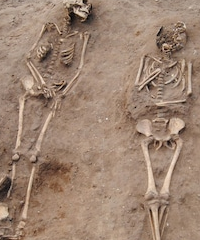
קֶבֶר
Strong’s #6913
qever
I am a stranger and a sojourner with you. Give me a possession of a burying-place with you, that I may bury my dead out of my sight. (Genesis 23:4)
The grave was commonly a cave owned by the family where its members were laid after death (see Genesis 49:30,31). This is often referred to in the Bible such as in the following verse: And David slept with his fathers, and was buried in the city of David (1 Kings 2:10). The verb form qavar (Strong’s #6912) means “to bury,” which is also found in the verse above.
Holy

קָדוֹשׁ
Strong’s #6918
qadosh
and ye shall be unto me a kingdom of priests, and a holy nation. These are the words which thou shalt speak unto the children of Israel. (Exodus 19:6)
Most of us have certain items in our homes that are used only during special occasion, such as a set of fine china dinnerware or a special suit or dress. Something that is set aside for a special purpose is what is meant by the Hebrew word qadosh. The furnishings in the tabernacle were qadosh and would never be used for anything but for use in the tabernacle, any more than one would take fine china on a camping trip. The nation of Israel was also qadosh; they were set aside from the other nations by God to do his work in the world. The word qadosh has been translated as “holy,” but this word has taken on a new meaning of its own: a person who is pious and righteous. This is not the true meaning of this word and demonstrates the need for getting back to the original meaning of Hebrew words.
Idol
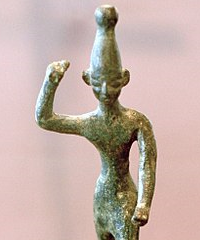
אֱלִיל
Strong’s #457
eliyl
Turn ye not unto idols, nor make to yourselves molten gods: I am YHWH your God. (Leviticus 19:4)
In Leviticus 19:4 we read, Do not turn to idols (eliyl) or make for yourselves molten gods (Leviticus 19:4). An idol is a statue of an image of a god that is believed to have supernatural powers. Such were used by many Semitic peoples living around the Hebrews and by the Hebrews themselves, at times. Interestingly, this word is also used in the following verse, As for you, you whitewash with lies; worthless (eliyl) physicians are you all (Job 13:4). An eliyl is anything that is considered to have value, but in reality, has no value at all.
Lightning
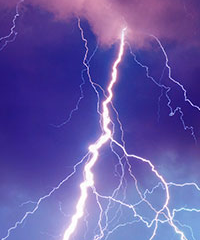
בָּרָק
Strong’s #1300
baraq
“And it came to pass on the third day, when it was morning, that there were thunders and lightnings, and a thick cloud upon the mount, and the voice of a trumpet exceeding loud; and all the people that were in the camp trembled.” (Exodus 19:16)
This word means “a flash of light” and is used for lightning, but also for the glistening of a metal weapon such as a sword (Deut 32:41) or spear (Nahum 3:3). In Psalm 144:6 lightning, through Hebrew parallelism, is seen as God’s arrows.
Love

אָהַב
Strong’s #157
ahav
and thou shalt love YHWH thy God with all thy heart, and with all thy soul, and with all thy might. (Deuteronomy 6:5)
We do not choose our parents or siblings, but instead they are given to us as a gift from above, a privileged gift. Even in the ancient Hebrew culture, one’s wife was chosen. It is our responsibility to provide and protect that privileged gift. In our modern Western culture love is an abstract thought of emotion, how one feels toward another, but the Hebrew meaning goes much deeper. As a verb, this word means “to provide and protect what is given as a privilege” as well as “to have an intimacy of action and emotion”. We are told to love Elohiym and our neighbors, not in an emotional sense, but in the sense of our actions.
Path

דֶּרֶךְ
Strong’s #1870
derekh
“So he drove out the man; and he placed at the east of the garden of Eden the Cherubim, and the flame of a sword which turned every way, to keep the way of the tree of life.” (Genesis 3:24)
A path is a well-marked road or trail that may be followed to lead one to a specific location. Throughout the Hebrew Bible, the word “path” is used for man’s journey through life. The path that is followed may be one that has been carved out by other men or by God.
Peace

שָׁלוֹם
Strong’s #7965
shalom
But thou shalt go to thy fathers in peace; thou shalt be buried in a good old age. (Genesis 15:15)
When we hear the word “peace,” as this word is usually translated, we usually associate this to mean an absence of war or strife. However, the Hebrew word shalom has a very different meaning. The verb form of the root word is shalam and is usually used in the context of “making restitution.” When a person has caused another to become deficient in some way, such as a loss of livestock, it is the responsibility of the person who created the deficiency to restore what has been taken, lost or stolen. The verb shalam literally means “to make whole or complete.” The noun shalom has the more literal meaning of “being in a state of wholeness,” or “being without deficiency.” The Biblical phrase shalu shalom yerushalayim (pray for the peace of Jerusalem) is not speaking about an absence of war (though that is part of it), but that Jerusalem, and by extension all of Israel, be complete and whole, and goes far beyond the idea of “peace”.
Proverb

מָשָׁל
Strong’s #4912
mashal
“And he took up his parable, and said, From Aram hath Balak brought me, The king of Moab from the mountains of the East: Come, curse me Jacob, And come, defy Israel.” (Numbers 23:7)
A ruler is someone or something that defines a standard of measure. This can be a stick with incremental lines on it for measuring or a person who defines the standard by which people live. The Hebrew verb meaning “to rule” is mashal and, when used in the participle form, it means “a ruler,” or “one who rules.” (Possibly the origin of our word marshal?) The noun form, also pronounced mashal, is a parable or proverb. The function of a parable or proverb is to define a standard of measure that one is to live by. For example, In all thy ways acknowledge him, And he will direct thy paths (Proverbs 3:6).
Psalm
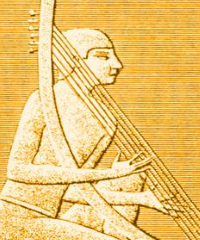
מִזְמוֹר
Strong’s #4210
mizmor
{To the chief Musician, A Psalm of David.} Deliver me, O LORD, from the evil man: preserve me from the violent man; (Psalm 140:1, KJV)
The verbal root zamar (Strong’s #2167) means “to make music by ‘plucking’ a musical instrument.” Music or melody is the Hebrew noun mizmor and is the word for a Psalm, a song accompanied by a stringed musical instrument. The verbal root zamar also means to “pluck” fruit.
Resting

מְנוּחָה
Strong's #4496
menuhhah
for ye are not as yet come to the rest and to the inheritance, which YHWH thy God giveth thee. (Deuteronomy 12:9)
The Hebrew verb nu’ahh (Strong’s #4496) means “to rest.” The noun form of this word is no’ahh meaning a “resting” and is also the Hebrew form of the name Noah. By adding the “ah” suffix (the feminine ending) and the “m” prefix, a common addition to a root to form another noun, the word menuhhah is formed and means a “resting place” or “place of rest.”
Scroll
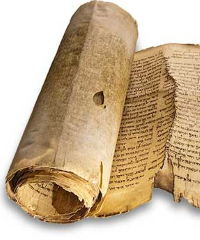
סֵפֶר
Strong’s #5612
sepher
This is the book of the generations of Adam. In the day that God created man, in the likeness of God made he him; (Genesis 5:1)
Books are a fairly recent invention. In ancient times texts were written down on square sheets of skin or papyrus (made from reeds and the origin of our word paper). Multiple sheets would then be sown together creating one long sheet called a scroll. This long sheet was then rolled up and placed in a leather sleeve or clay jar for storage. In caves near the Dead Sea in Israel hundreds of these scrolls were discovered, which included texts of the Tenakh (Old Testament) as well as non-Biblical texts.
Shophar
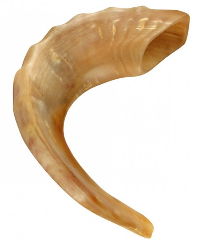
שׁוֹפָר
Strong’s #7782
shophar
“Then shalt thou send abroad the loud trumpet on the tenth day of the seventh month; in the day of atonement shall ye send abroad the trumpet throughout all your land.” (Leviticus 25:9)
Made from a ram’s horn, the shofar was used to call an assembly together or an army to battle. The shofar was used in ancient times, as well as in modern times, during the feasts of YHWH and on the Shabbat. In Exodus 19:16, 19:19 and 20:18 the people heard a very loud shofar blast coming from the mountain of God, giving them great fear. This was also the instrument that was sounded when the walls of Jericho fell (Joshua 6:4).
Star

כּוֹכָב
Strong’s #3556
kokav
“And he brought him forth abroad, and said, Look now toward heaven, and number the stars, if thou be able to number them: and he said unto him, So shall thy seed be.” (Genesis 15:5)
Of course we know that stars are extremely large balls of gas trillions and trillions of miles out in space, but how did the Ancient Hebrew perceive the stars? Reading the Bible must be from the Hebrew perspective, not ours. The Hebrews, being nomads, lived in black goat hair tents. The hair fabric had pinholes of light and when looking up at the tent roof, it looked just like the night sky. This is alluded to in Isaiah 40:22: [God] stretcheth out the heavens as a curtain, and spreadeth them out as a tent to dwell in.
Teachings

תּוֹרָה
Strong’s #8451
torah
Because that Abraham obeyed my voice, and kept my charge, my commandments, my statutes, and my laws. (Genesis 26:5)
One of the most misunderstood words in the Hebrew Bible is the Hebrew word torah. This word is usually translated as “law,” which by definition is a set of rules and regulations established by a government and are enforced with the threat of fines or imprisonment. However, the word torah literally means “teachings,” a set of instructions given by a teacher or parent in order to foster maturity, and is enforced with discipline and encouragement.
Truth

אֶמֶת
Strong’s #571
emet
Thy righteousness is an everlasting righteousness, And thy law is truth. (Psalm 119:142)
The root of this word is aman (Strong’s #539), a word often translated as “believe,” but more literally meaning “support,” as we see in Isaiah 22:23 where it says “I will drive him like a peg in a place of support...” A belief in Elohiym is not a mental exercise of knowing that Elohiym exists, but rather our responsibility to show him our support. The word emet has the similar meaning of firmness, something that is firmly set in place.
Water

מַיִם
Strong’s #4325
mayim
And the earth was waste and void; and darkness was upon the face of the deep: and the Spirit of God moved upon the face of the waters. (Genesis 1:2)
This word is first used in the above verse. This Hebrew word is used for any water, whether it is a jar of water or the water of the oceans. A very interesting Hebrew idiom is “water at the feet” meaning “urine” (2 Kings 18:27).
Wind

רוּחַ
Strong’s #7307
ru’ahh
And the earth was waste and void; and darkness was upon the face of the deep: and the Spirit of God moved upon the face of the waters. (Genesis 1:2)
In Hebrew thought the wind can be many things. It is the wind that blows in the sky, it can be the breath of man or animals and it is also the breath of God. In Hebrew thought your breath is your character or essence; it is what makes you, you. The breath, or wind of God, is his character or essence. In the same way that our breath is like a wind, God is like a wind. God is not an individual person that exists as we do; he is everywhere just like the wind is everywhere. Many times the Hebrew word ru’ahh is translated as “spirit,” but this abstract term takes us away from the real concrete meaning of the Hebrew word. Rather than looking at God as a spirit, we can read the text more Hebraicly if we replace the word “spirit” with “wind.”
 | Join my mail list and discover new insights into the language and culture of the Bible — plus, get a FREE e-book |




